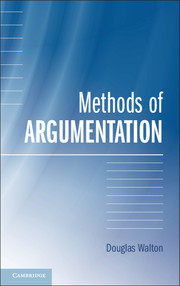Book contents
- Frontmatter
- Contents
- Acknowledgments
- 1 Introducing Some Basic Concepts and Tools
- 2 Argument Attack, Rebuttal, Refutation and Defeat
- 3 Arguments with Missing Parts
- 4 Applying Argumentation Schemes
- 5 Similarity, Precedent and Argument from Analogy
- 6 Teleological Argumentation to and from Motives
- 7 The Carneades Model of Scientific Discovery and Inquiry
- 8 Fallacies, Heuristics and Sophistical Tactics
- 9 The Straw Man Fallacy
- Bibliography
- Index
9 - The Straw Man Fallacy
Published online by Cambridge University Press: 05 June 2014
- Frontmatter
- Contents
- Acknowledgments
- 1 Introducing Some Basic Concepts and Tools
- 2 Argument Attack, Rebuttal, Refutation and Defeat
- 3 Arguments with Missing Parts
- 4 Applying Argumentation Schemes
- 5 Similarity, Precedent and Argument from Analogy
- 6 Teleological Argumentation to and from Motives
- 7 The Carneades Model of Scientific Discovery and Inquiry
- 8 Fallacies, Heuristics and Sophistical Tactics
- 9 The Straw Man Fallacy
- Bibliography
- Index
Summary
Straw man is a modern addition to the list of informal fallacies treated in logic textbooks, where it is said to be the fallacy of misrepresenting an opponent’s real position as a weaker one that can more easily be attacked (Johnson and Blair, 1983; Freeman, 1988; Govier, 1992; Walton, 1996c). However, much earlier, Aristotle remarked (Topics 159b30–35) on the danger in argumentation of misrepresenting another arguer’s position, and no doubt philosophers have often made similar comments in the past. Thus although straw man represents the extreme kind of case of misrepresenting another arguer’s position, it would be useful more generally to have some tool that could assist in making objective determinations of when an expressed position has been wrongly represented in a given case. For it is a rule of rational argumentation that before you criticize or refute another party’s view in a critical discussion, you should be sure that the view you are attacking actually represents the other party’s position. This chapter develops a formal dialogue system that can utilize three different kinds of commitment query inference engines that are designed to help in analyzing and evaluating cases where the straw man fallacy is alleged to have been committed.
Such an engine is meant to be used to search through an arguer’s commitment set in a case of argumentation that can be structured in a formal dialogue format, so that it can be fairly judged whether a queried statement is in an arguer’s commitment store or not. Only if it is not in the arguer’s commitment store can an attacker of the alleged position of the second party be fairly judged to have committed the straw man fallacy, based on the evidence in the case at issue. The project undertaken is not to implement any of these inference engines computationally, but only to construct formal models specifying generally how they should work.
Information
- Type
- Chapter
- Information
- Methods of Argumentation , pp. 249 - 286Publisher: Cambridge University PressPrint publication year: 2013
Accessibility standard: Unknown
Why this information is here
This section outlines the accessibility features of this content - including support for screen readers, full keyboard navigation and high-contrast display options. This may not be relevant for you.Accessibility Information
- 2
- Cited by
